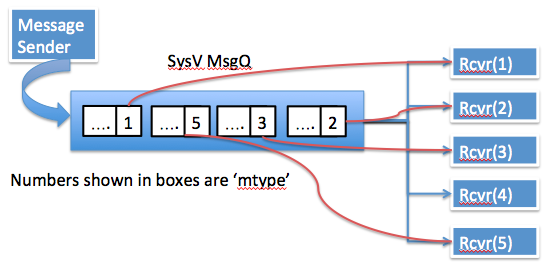In project Whitefield, I needed to select an IPC mechanism which could,
- Req#1: provide a way for a process to receive messages with specific type i.e. a message intended for the process based on some id.
- Req#2: a event based mechanism (such as poll/select/epoll) for receiving messages
Use of ‘mtype’ in sysv msgq
Sysv message queue supports req#1 in a very elegant manner. A message could be posted using a specific ‘mtype’ such that a receiver process could call the interface msgrcv with that particular mtype to receive only those marked messages, all on the same shared queue.
Surprisingly, this feature is missing in Posix message queues.

Event based handling
Sysv msqq does not offer a descriptor which can be used in conjunction with select/poll/epoll. This is rather a very big limiting factor for sysv msgqs, since now there is no way of getting the events about message reception asynchronosly. Essentially if you want to handle sysv msgqs then you have to poll in msgrcv() in non-blocking mode or block on msgrcv in a separate thread.
Thought for the day…
Posix msgq is touted to be very similar to sysv msgq and since it was designed much later, it was assumed that posix msgqs provides all the important functions provided by sysv msgq. Quote from Posix msgq man page ‘man mq_overview’:
“This API is distinct from that provided by System V message queues (msgget(2), msgsnd(2), msgrcv(2), etc.), but provides similar functionality.”
“but provides similar functionality” … well it doesn’t!
I ended up using…
In my case, I ended up using SysV message queues by blocking msgrcv in a separate thread since the use of mtype was absolutely central to my design requirement. I considered using sockets for the purpose, but it required me to bind to different ports in case of UDP/TCP and it was difficult for me to ascertain if the range of ports would be available on the target machine. I also considered using Unix domain sockets, but again the handling of socket files (and ensuring a writeable folder/path) was somthing i wanted to avoid.
Long story short…
Posix message queues are not similar to SysV message queues and Posix message queues may not have better functionality than SysV message queues. There are still use-cases where SysV message queues makes sense.
Update (7-Apr-18)… Switching to Abstract unix domain datagram sockets
Turns out using a separate thread with a blocking msgrcv() of sysv msgq is not easy. The synchronization between main processing thread and this msgrcv() thread is non-trivial and will cause performance issues. Also i noticed that unix domain sockets have an ‘abstract’ mode wherein i do not have to worry about maintaining a writeable file system path. Thus I ended up updating Whitefield’s commline interfaces to use ‘Abstract Unix domain datagram sockets’. So to summarize:
- SysV msgq ‘mtype’ allowed every process to listen for its own ‘mtype’ messages. With unix domain sockets this was achieved by binding to a specific path derived using ‘mtype’.
- SysV msgqs could not be used with select/poll/epoll. Unix domain sockets can be used with such event based primitives.
- Using ‘abstract’ unix domain sockets, the process does not need to worry about ensuring writeable filesystem path.
- Using datagram mode of abstract unix domain sockets allowed any to any communication between processes without managing multiple socket descriptors.